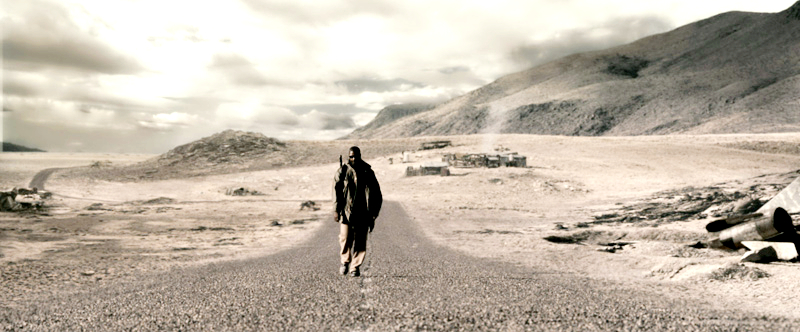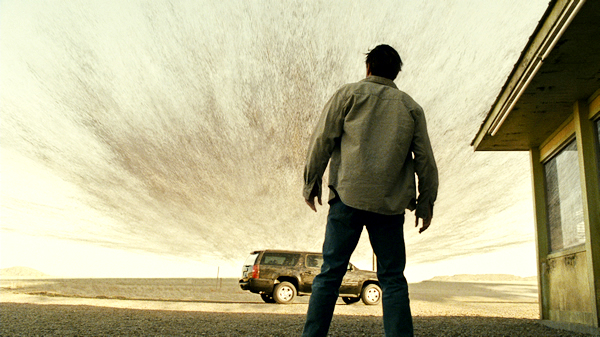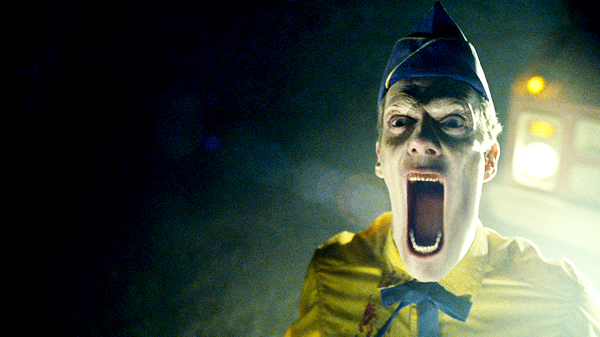Hello again, and a happy New Year’s Eve to you and yours. Well, I thought this Best of the Decade would end up being four parts, but now it’s looking like five. The recaps for this last twenty-five got so long that MT seems to be consuming the bottom of the entry as I write.
So, with that in mind, here’s #’s 25-11 for the Oughts, with the top ten of the decade to follow in due course. If you’re new to this overview, be sure to check out part 1, part 2, and part 3 before moving on to the…
Top 100 Films of the Decade: Part IV: 25-11
[The Rest of the List: 100-76 | 75-51 | 50-26 | 25-11 | 10-1]
[2000/2001/2002/2003/2004/2005/2006/2007/2008/2009]
 25. Donnie Darko (2001)
25. Donnie Darko (2001)
| From the original review: “All in all, this is a marvelously genre-bending film with wonderful anchoring performances by the Gyllenhaals. I think I liked this movie much more for not knowing a lot about it going in, so I won’t mention the particulars here. But it’s definitely worth seeing. Extra points for the soundtrack, which with ‘Head over Heels,’ ‘Love will Tear Us Apart,’ and ‘Under the Milky Way’…reminded me more of my own high school experience than any other film I can remember. (The Dukakis era setting helped, since that was my own eighth grade year.)“ |
I almost took this movie out of the top 25 on account of its association with Southland Tales and The Box, and even the director’s cut of this film, which snuffs out a lot of this movie’s weird magic by slathering it in needless Midichlorian-style exposition. As I said in my recent review of The Box, Donnie Darko seems to be a clear and undeniable case where studio intervention saved a movie.
Nevertheless, part Philip K. Dick, part John Hughes, Darko was a touching coming-of-age story (thanks in good part to Mary McDonnell and Holmes Osborne as Donnie’s cranky but loving parents), a decently funny satire about the vagaries of small-town life (think Sparkle Motion, “sleep-golfing,” and the Love-Fear axis), and a trippy sci-fi/psychological thriller. (Was Donnie really talking to a demon-rabbit from the future, or was he just off his meds? The original version muddles this question a lot better than the Kelly cut.)
Whether or not Richard Kelly just got struck by lightning here, everyone else involved clearly brought their A-game to this production. Two Gyllenhaals got on the Hollywood board with this flick, although Maggie would have to wait for Secretary to really break out. The Michael Andrews score contributed mightily to the proceedings, as did the Gary Jules cover of “Mad World,” which got a lot of run in the Oughts, from Gears of War to American Idol. And there are plenty of quality performances in the margins, from the late Patrick Swayze riffing on his image, to Beth Grant typecasting herself for the decade, to Katharine Ross coming back for one more curtain call. Fluke or not, the original version of Donnie Darko was one strange and memorable bunny, alright.
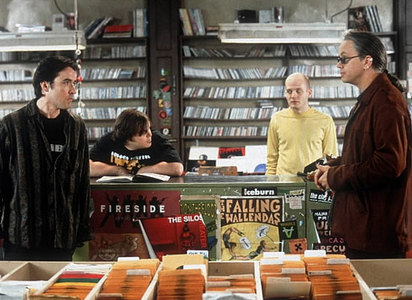 24. High Fidelity (2000)
24. High Fidelity (2000)
| From the year-end list: “An excellent adaptation of a great book, even if I preferred the Elvis Costello britrock emphasis of Hornby’s tome to the indie Subpop scene of the movie.“ |
“Charlie, you f**king b**ch! Let’s work it out!” Arguably John Cusack’s finest hour (although 1999’s Being John Malkovich is right up there, and I know many might cite the Lloyd Dobler of old), Stephen Frears’ adaptation of Nick Hornby’s High Fidelity has continued to grow on me over the years. If it counts as one of David Denby’s slacker-striver romances (see the discussion of Knocked Up at #40), it’s definitely the one that hits closest to home for me.
The first thing people usually remember about this movie is all the Jack Black/Todd Louiso banter in the record store. (“It’s a Cosssssby sweater!“) And it’s true — All of that stuff is both really funny and all too telling about the elitism and obsessiveness inherent to the fanboy mentality — “Don’t tell anyone you don’t own ‘Blonde on Blonde’! It’s gonna be okay.” Besides, let’s face it, this entire end-of-the-decade list is really just an extended High Fidelity-style Top 5 (and I had a great time back in July organizing my history books chronologically, a la Rob’s record collection.)
Still, as with the book, High Fidelity‘s killer app is really the dispatches filed from Rob’s romantic life, as he ponders what went wrong with his Top 5 Crushes gone awry. (“We were frightened of being left alone for the rest of our lives. Only people of a certain disposition are frightened of being alone for the rest of their lives at the age of 26, and we were of that disposition.“) There’s a lot of truthiness throughout High Fidelity, from Rob’s catastrophic hang-up on Charlie (Catherine Zeta Jones) to his eff-the-world rebound with an equally besotted Sarah (Lili Taylor), to his single-minded infatuation about whether his ex, Laura (Iben Hjejle), has slept with the loathsome new boyfriend, Ian (fellow Tapehead Tim Robbins in a great cameo) yet.
In short, I’d argue High Fidelity gets the inner-male monologue closer to right than any flick this side of Annie Hall. In the immortal words of Homer J. Simpson, it’s funny because it’s true.
 23. In the Mood for Love (2000) / 2046 (2004)
23. In the Mood for Love (2000) / 2046 (2004)
| From the original review: “By the end of this extended tale of romance and loss, I had half a mind to just curl up in a ball and drift amid a sea of despond for the rest of the night, lost in the phantom reverie that was both the allure and prison of “2046” in 2046. Even stronger was the urge to light a cigarette and watch the tendrils of smoke slowly writhe and curl through a shaft of light, preferably to the strands of some vintage Nat King Cole. If nothing else, these very worthwhile films suggest, if you’re going to ruminate on old heartaches, you might as well look really good doing it.” |
Some might consider this cheating to include Wong Kar-Wai’s In the Mood for Love and 2046 in the same spot. But I watched them back-to-back in the same evening, and so they’re inextricably tied together to me, even more than they would be anyway.
No word better describes these two films than sensual. The ruffle of silk, the click-clack of Mahjongg tiles, the strains of Nat King Cole, the ice cubes popping in the glass, the tendrils of smoke wafting through a shaft of light, the bead of sweat slowly gliding down the neck of Maggie Cheung. Wisps of melancholy, twinges of regret, and an irrepressible longing. Those are the grace notes Wong Kar-Wai uses to compose this evocative, moving duet about a love story that barely ever happened, and the lingering effect it has (throughout 2046) on Tony Leung. Unlike the almost-clinical restraint of, say, Ang Lee (see, for example, Lust, Caution) Wong Kar-Wai’s films burst at the seams with emotion, and these two are no exception. Unforgettable, that’s what they are.
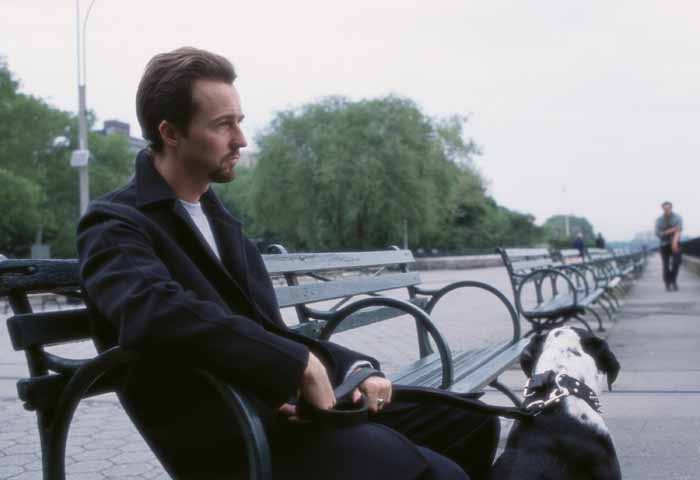 22. The 25th Hour (2002)
22. The 25th Hour (2002)
| From the original review: “[I]t perfectly captured the feeling of life in New York after the fall. Everyone’s trying to go on with their business and pretend to move on, and yet everywhere you look there are grim reminders of that day’s events, and somehow it’s all you end up talking about. And the last fifteen minutes of the film, which tread a very fine line between hokey and surprisingly touching, are a haunting representation of what was lost that day (and, Lee seems to suggest, what could be lost if further attacks necessitate a New York diaspora.) In effect, this is Lee’s ode to NYC’s magic and resilience, and I think there were very few other filmmakers that could have pulled this off.”
From the year-end list: “Another 2002 hold-over, and the best film yet made about the aftermath of 9/11, (which only seems natural, given that it’s by one of New York’s finest directors.) Haunted by might-have-beens, what-ifs, and what-nows, The 25th Hour feels real and immediate in its attempt to grapple with both 9/11 and the slamming cage in Monty Brogan’s future. Only once, with the Fight Club-like fracas in the park, does the film flounder. Otherwise, it’s a thought-provoking meditation throughout.“ |
What I said back in 2003 holds true now: In a decade that became irrevocably warped by the events of 9/11, Spike Lee’s The 25th Hour is still the best movie yet made about the emotional aftermath of that dark day. And just as Inside Man covered a lot of the same ground on race as the woefully overrated Crash, all the while managing to tell a zippy heist tale, The 25th Hour does almost all of this 9/11 heavy lifting as subtext to the story at hand.
For Edward Norton’s Monty Brogan, who’s facing down a prison sentence, as with everyone else, there is a hole in the center of the world. Things have changed, and the question now is what to do about it. Some grasp desperately for new meaning and connection in others, like Philip Seymour Hoffman’s schlubby teacher, eyeing his student (Anna Paquin) in a nightclub. Some refuse to acknowledge the new reality at all, and just get louder and more obstinate about the way things are, like Barry Pepper’s Wall Street trader. And some, like Monty, take the time to reflect on what’s brought this lowly state of affairs.
The memorable scene where Monty rages at the bathroom mirror about New Yorkers and city life is classic Spike. It’s funny, it knows its NYC, and it brings to mind all the mistrusts that led to tragedy one sweltering Brooklyn day in 1989’s Do the Right Thing. But the coda of The 25th Hour, arguably the most lyrical sequence Lee has ever assembled, goes even deeper. It waxes on the underlying bond of New York, what it really means to be from NYC. “You’re a New Yorker, that won’t ever change. You got New York in your bones. Spend the rest of your life out west but you’re still a New Yorker. You’ll miss your friends, you’ll miss your dog, but you’re strong.” And it explains exactly what was lost that Tuesday morning at Ground Zero, the Pentagon, and the fields of Pennsylvania — the chance for 2752 men, women, and children to experience a long and happy life.
I’ll let Brian Cox take it from here: “You have a son, maybe you name him James, it’s a good strong name, and maybe one day years from now years after im dead and gone reunited with your dear ma, you gather your whole family around and tell them the truth, who you are, where you come from, you tell them the whole story. Then you ask them if they know how lucky there are to be there. It all came so close to never happening. This life came so close to never happening.”
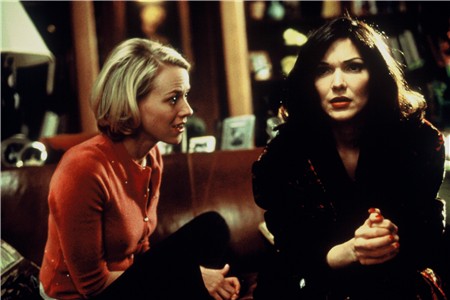 21. Mulholland Drive (2001)
21. Mulholland Drive (2001)
| From the year-end list: “Just when you thought it was safe to see a David Lynch film. After the surprisingly conventional Straight Story, Mulholland proves that David Lynch is still a master craftsman of the mindbender.“ |
I still haven’t seen Inland Empire, David Lynch’s only other full-length film of the decade. (And at three hours, it’s definitely “full-length.” Offhand, according to a friend of mine, the IFC Center in the Village apparently had a “see-it-nine-times, get-the-tenth-time-free” special going on during its run.) Nonetheless, the eerie and unsettling Mulholland Drive is Lynch in top form, and a definite improvement on his last mindbender, 1997’s so-so Lost Highway.
Lynch tends to repeat himself quite a bit, true. Dean Stockwell sung about the Sandman in Blue Velvet, and here we have Roy Orbison being crooned in Spanish. And, as always, there’s a bizarre conspiracy afoot — this time, involving a cowboy. Still, when Lynch is on, nobody is as good at making you feel like you’re trapped in a nightmare, maybe even someone else’s nightmare, and just can’t wake up. (With that in mind, certain elements of 1992’s Twin Peaks: Fire Walk With Me still make me shiver just thinking about them — the moving picture on Laura’s wall, for example, or the Ray Wise trapped-monkey thing. Garmenbozia…)
Obviously, there’s a lot of that sort of stuff here too — the whatever-it-is behind the diner, the blue box, the corpse with a hole for a face. Dune and The Straight Story notwithstanding, Lynch’s movies tend to move to dream logic, and Mulholland Drive was no exception. This one is about the Hollywood dream. Like Naomi Watts’ character, most folks move out there with reveries of being a star, (“I just came here from Deep River, Ontario, and now I’m in this dream place!“) And, like Naomi Watt’s character, a lot of them see that dream die hard. albeit perhaps not as hard as she does. (One small irony here: Thanks to Mulholland Drive, Naomi Watts is now an A-lister.)
Who knows how Mulholland Drive would’ve ended up if it had been optioned as the television show it was meant to be? But as a movie, it turned out to be pretty darned disconcerting, and one of the best films of the decade.
 20. The Diving Bell and the Butterfly (2007)
20. The Diving Bell and the Butterfly (2007)
| From the original review: “[A]n impressive and heartfelt depiction of how one man’s personal Hell becomes, through love, will, memory, and imagination, at least a barely endurable purgatory…And, when the camera later forsakes the diving bell world of flesh and frailty for the butterfly realm of memory and imagination, we feel the same exhilarating sense of liberation Bauby describes in voiceover. By finally soaring out of the confines of Bauby’s body and roaming the world with abandon, Diving Bell offers a visceral reminder of the power of film, and of imagination.”
From the year-end list: “Through the wonders of cinematic alchemy, Julian Schnabel took the sad real-life account of Vogue editor Jean-Do Bauby’s horrific imprisonment within his own body and made it soar. No other film this year put the “locked-in” experience of taking in a movie as inventively in service of its story…Special kudos to Mathieu Almaric for conveying so much with so little to work with, and to Max von Sydow for his haunting turn as Bauby’s invalid father.“ |
Aside from being a moving story about adversity overcome, Julian Schnabel’s The Diving Bell and the Butterfly has one really great conceit that makes the whole film work wonders: A moviegoer is as locked-in to whatever’s on the screen as poor Jean-Do Bauby was in his paralyzed form. This conceit — making “the male gaze” literal — forms the basis of much of the Diving Bell experience, and it’s what really makes the movie tick.
The first twenty minutes or so of the movie are completely claustrophobic, mainly because you’re locked-in there right next to Mathieu Almaric. And when Bauby finally begins to use his imagination to drift outside himself, and the camera at long last begins to move, the effect is as liberating and refreshing to us as a breath of cold mountain air. We viscerally feel the sense of reprieve that Jean-Do Bauby wrote about in his posthumous memoir, blink by pain-staking blink. It’s no mean trick, and it gives The Diving Bell and the Butterfly a real emotional wallop that’s hard to shake off and harder to forget.
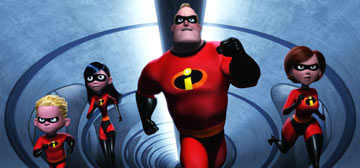 19. The Incredibles (2004)
19. The Incredibles (2004)
| From the original review: “Well, the folks making next summer’s Fantastic Four film must be having a really bad couple of weeks. ‘Cause it’s hard to see how they can even close to topping the energy and fun of Brad Bird’s The Incredibles, Pixar’s new gold standard (and here I thought Toy Story 2 was going to hold that honor for some time to come.) More a film for comic fans than for little kids, The Incredibles is an inventive, madcap romp through superhero tropes that gives Spiderman 2 a serious run for its money as the best comic book film of 2004.”
From the year-end list: “Pixar has been delivering well-constructed eye-popping wonders since Toy Story, and The Incredibles is the best of the lot. I figured it might be awhile before a movie topped Spiderman 2 as a sheer comic book spectacle, but, as it turned out, The Incredibles did it only a few months later. One of the best comic book films ever made, The Incredibles was two hours of unmitigated fanboy fun.“ |
To be honest, and as with Ratatouille (another Brad Bird-helmed Pixar production), I’m still a bit concerned about the political economy of The Incredibles. I’m all for an aristocracy of excellence, but it’s hard to shake the contempt-for-the-rabble undertones and vaguely Ayn Randish sensibility that both Brad Bird movies possess, what with their “actually, some children (or rat chefs) are more special than others” through-lines. (And while I’m on the subject, I don’t really cotton much to Craig T. Nelson’s worldview either.)
But, now that I’ve gotten that out of the way, The Incredibles was as fun and imaginative a comic-book movie as we saw in the Oughts. True, like the television show Heroes, The Incredibles borrowed substantially from Alan Moore’s Watchmen before Zack Snyder ever got around to it. But, as I said back in 2004: More than anything else, The Incredibles — apologies to Tim Story, both times — was probably the closest thing we’ll ever get to a really good Fantastic Four movie, right down to the Mole Man-like Underminer that closed the film.
 18. Memento (2000)
18. Memento (2000)
| From the year-end list: “In a spring and summer characterized by truly awful blockbusters, this small film proved that a great story is still the best eye-catcher around. A gimmick, perhaps, but flawlessly executed.“ |
“Now…where was I?” With Guy Pearce reprising Tom Hanks’ earlier role as Mr. Short-Term Memory, Christopher Nolan kicked off a strong decade with Memento his sleek, well-scripted psychological thriller about an amnesiac in pursuit of justice (re: vengeance) for his murdered wife. As with Diving Bell and the Butterfly, this movie relies heavily on one neat trick that most everyone knows by now — the story is told backwards. But, even that gimmick notwithstanding, Memento still holds up. (In fact, I watched it again this summer, and was surprised by how engaging it remained.)
To put on the political cap for a second, you could argue the questions Memento poses resonated throughout the Oughts. Like other folks we might mention, Guy Pearce’s character here bends the facts of a horrible crime to slake a thirst for revenge. He pins the blame on crooks who had nothing to do with his original motivation. He wallows in an aggrieved, even mostly-contrived sense of injustice to propel himself forward to darker deeds. And he just keeps forgetting what really happened, because, as George Costanza once instructed us, “It’s not a lie if you believe it.” Sound like anyone from the past decade? Hmmm…I’ll have to think on it.
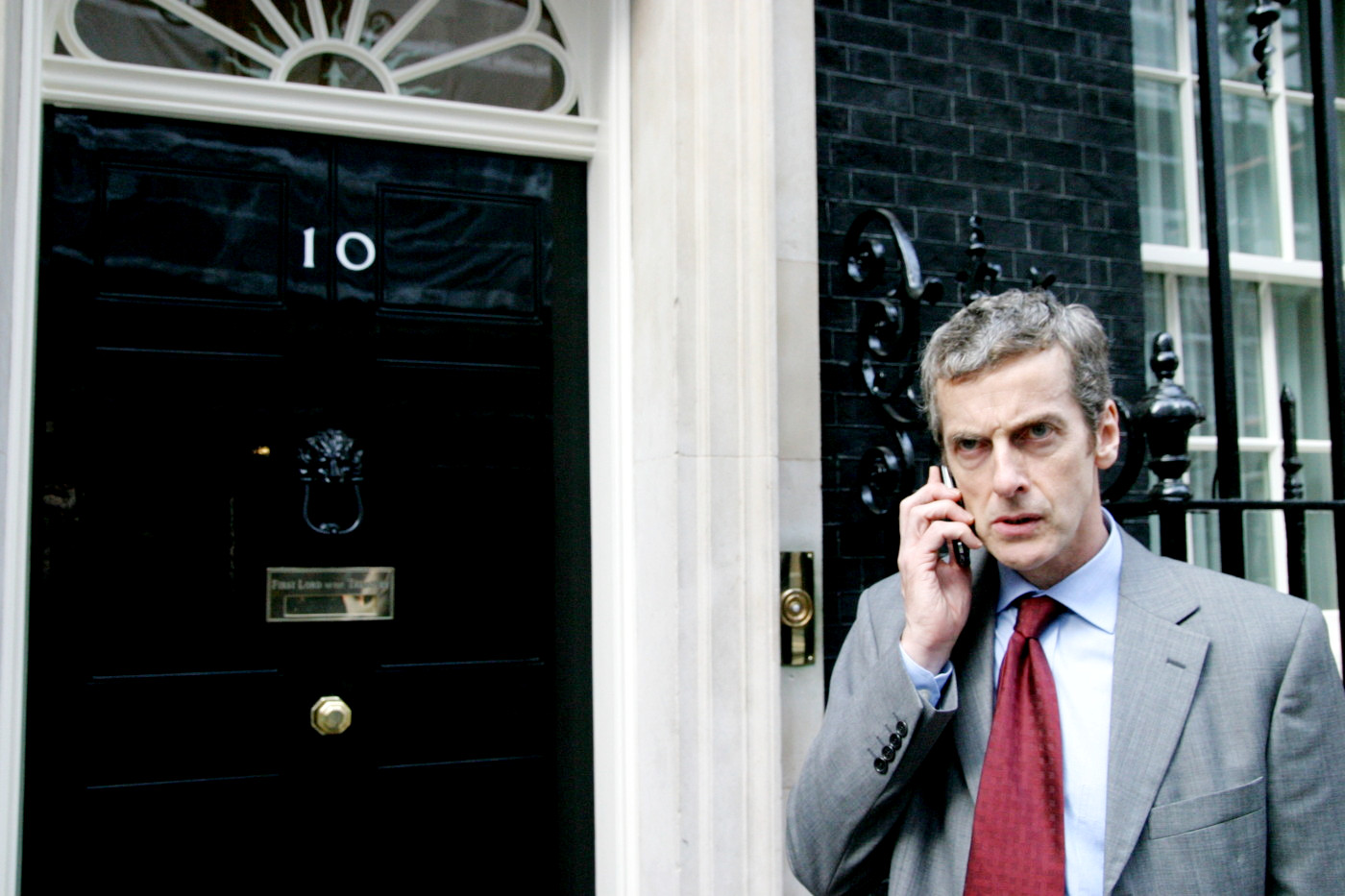 17. In the Loop (2009)
17. In the Loop (2009)
| From the original review: “[T]his is a gut-bustingly funny film. I honestly can’t remember the last time I laughed so hard in a theater. (Alas, it was probably 21 Grams, and that was for all the wrong reasons.) True, given that this is a sharp-edged, basically anti-Dubya political satire that goes out of its way to reward pop-culture geekery (Frodo, Ron Weasley, and the White Stripes are all used as epithets at one point or another), I’m probably as close to a target audience for this sort of movie that’s out there. Nevertheless, if your sense of humor runs anywhere from squirmathons like The Office UK or Curb Your Enthusiasm to sardonic political comedies like The Candidate or Bob Roberts to the current-events commentaries of Stewart and Colbert, this movie is a must-see. (And if you don’t find hyperarticulate Scotsman Peter Capaldi spewing forth rococo profanities funny just yet, you probably will after watching In the Loop.)”
From the year-end list: “I’m not normally a huge laugher at movies, but this flick had me rolling. Basically, In the Loop is Office Space for people in politics, and it’s a smart, wickedly funny entertainment. And like Judge’s film and The Big Lebowski, I expect it will enjoy a long, happy, and very quotable renaissance on DVD. If you find The Daily Show or Colbert Report at all enjoyable, this is a must-see. And, even if you don’t, well the choice Scottish swearing should get you through.“ |
How best to explain In the Loop? Perhaps a show of the wares. Ladies and Gents, I give you 10 Downing Street’s honorable, inimitable Malcolm Tucker (Peter Capaldi), and his strongly-worded request to Britain’s UN Ambassador that he reschedule a crucial Security Council vote: “Just f**king do it! Otherwise you’ll find yourself in some medieval war zone in the Caucasus with your arse in the air, trying to persuade a group of men in balaclavas that sustained sexual violence is not the f**king way forward!”
Or, Exhibit B: Here’s Mr. Tucker on the relative youth of his political counterparts in the White House: “His briefing notes were written in alphabetti spaghetti! When I left, I nearly tripped up over his f**king umbilical cord…Yeah, apparently, your f**king master race of highly-gifted toddlers can’t quite get the job done between breast feeds and playing with their Power Rangers. So, an actual grown-up has been asked to f**king bail you out!”
Now imagine two hours of these sorts of unspeakably filthy, top-shelf dressings-down, rat-a-tatting back and forth so quickly that you can barely keep on top of them all. That’s In the Loop, a hilarious tirade about the Dubya-Blair shenanigans in Iraq that I expect will definitely pass the test of time. After all, the topic is timely, but funny is timeless.
 16. Traffic (2000)
16. Traffic (2000)
| From the year-end list: “An expertly-made, nuanced glimpse at the drug trade that was good enough to convince policymakers in Washington…of the inefficacies of fighting supply at the expense of demand. Gets better with repeated viewings.“ |
This is a movie that bounced back and forth with the very similar #14 before losing out to that fine production in the end, for reasons I will explain below. Nonetheless, Steven Soderbergh’s moody and cerebral dissection of the drug trade is a keeper. From Benicio del Toro’s compromised Mexican cop — a guy who just wants to do one thing right by his neighborhood — to Michael Douglas’ embattled and eventually embittered top drug warrior, Traffic is blessed with involving, multi-dimensional performances across the board. In fact, Soderbergh even figured out how to get the likes of John McCain and Orrin Hatch to support common-sense drug reforms: appeal to their vanity and put them in the movie.
Just as an aside, the Michael Douglas role in Traffic is one of many great parts that Harrison Ford, arguably the biggest box office draw of the 80’s and 90’s, turned down in the Oughts, along with a part in #14 below and several others. Instead, from the man who was Han Solo, Indiana Jones, Jack Ryan, etc., we got Crossing Over and Extraordinary Measures (and, of course, Crystal Skull). The upshot being, Ford needs a new agent, stat.
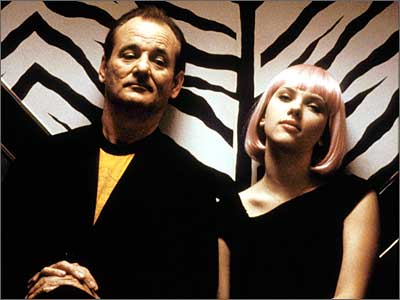 15. Lost in Translation (2003)
15. Lost in Translation (2003)
| From the original review: “[A]n unflinching look at the agony and torment of the human soul that is lying around your five-star Tokyo hotel with nothing to do…The film is funny, touching, sweet, often entrancing, and Bill Murray is really wonderful in the lead. It captures the disembodied detachment of travel insomnia and the exquisite anticipation of a newly-made connection in ways that belie the standard Hollywood older-man-meets-younger-woman narrative (Re: mogul wish fulfillment.) I do have nagging problems with Lost in Translation….But, not to lose the forest for the trees, I did quite like Lost in Translation. The film is honest and poignant in its depiction of two ships passing in the night, and Bill Murray – almost always good these days – is outstanding.”
From the year-end list: “It was fun for a while, there was no way of knowing. Like a dream in the night, who can say where we’re going? I still think Sofia Coppola cut a little close to the bone here in terms of autobiography…Still, I find this tale of chance encounters and foreign vistas has a strange kind of magic to it, and it has stayed with me longer than any other film this year. Bill Murray comes into full bloom in a part he’s been circling around his entire career…Lost in Translation has its problems, sure, but at it’s best it’s haunting, ethereal, and touching like no other film in 2003.“ |
More than this, you know there’s nothing…well, ok, except 14 other movies. Anyway, the problems I mentioned above still linger — the obvious score-settling aspects of Translation (Giovanni Ribisi and Anna Faris as Spike Jonze and Cameron Diaz respectively) are hard to watch, and Scarlett Johansson’s character should really just, you know, get out more — Being stuck in some po-dunk, one-horse town is one thing, being stuck in a five-star hotel in Tokyo is another thing entirely.
But, all that being said, Sofia Coppola’s Lost in Translation is still a very, very good film. It perfectly distills that weird amalgam of jetlag, culture clash, opportunity, and wonder that accompanies foreign travel. (As Tyler Durden put it in 1999, “If you wake up at a different time, in a different place, could you wake up as a different person?“) And it manages to realistically depict a nuanced, complex relationship that lies somewhere between friendship and romance, one that begins with a chance meeting and ends with a whisper. While Bill Murray tends to be the best thing about a lot of movies, neither he nor Scarlett Johansson — nor, for that matter, Coppola — have reached these heights before or since.
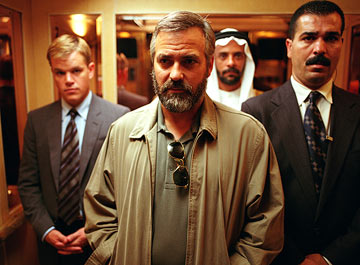 14. Syriana (2005)
14. Syriana (2005)
| From the original review: “While perhaps a bit too dry and convoluted for some tastes, Stephen Gaghan’s Syriana is, IMHO, a top-notch political thriller that’s easily one of the best films of the year. Admittedly…the movie definitely can be tough to follow. But, in a way, that’s part of its charm — Like the film’s protagonists, we only occasionally glimpse the shadowy tendrils of the beast that is Big Oil, and come to share their despair that it can ever be subdued. In sum…Syriana is both an intelligent, compelling work of cinema and a enthralling piece of social commentary, one that not only feels pertinent but necessary.”
From the year-end list: “I know Stephen Gaghan’s grim meditation on the global reach and ruthlessness of the Oil Trade rubbed some people the wrong way, but I found it a gripping piece of 21st century muckraking, in the venerable tradition of Ida Tarbell and Upton Sinclair. True, Christopher Plummer was a mite too sinister, but otherwise Syriana offered some of the most intriguing character arcs of the year, from morose CIA Field Agent George Clooney’s ambivalent awakening to corporate lawyer Jeffrey Wright’s courtship with compromise. In a year of well-made political films, among them Good Night, and Good Luck, Munich, Lord of War, and The Constant Gardener, Syriana was the pick of the litter.“ |
What Steven Soderbergh’s Traffic is to drugs, Stephen Gaghan’s Syriana is to the black gold, Texas tea. In fact, from tone to general approach to their subject, the films almost seem of a piece. (This probably shouldn’t be surprising. After all, Stephen Gaghan wrote the screenplay for Traffic, adapting it from the BBC mini-series.)
As I said, these two movies went back and forth. But I ended up putting Syriana above Traffic because — even with Christopher Plummer’s evil lynchpin figure involved — the latter film seemed messier and more ragged to me. Traffic ends with Don Cheadle getting an illicit wire up on Catherine Zeta-Jones’ inherited drug business, Benicio Del Toro winning a key victory, and Michael Douglas deciding to speak from the heart at a press conference, in the manner of movies since Mr. Smith Goes to Washington. But Syriana ends with Jeffrey Wright basically just switching teams, while Matt Damon and George Clooney survey the wreckage of a political assassination they could not prevent.
Neither movie is what you call a feel-good film, and both are cogent works of muck-raking done extremely well. But, even more than Traffic, Stephen Gaghan’s Syriana offers no feel-good escape or easy answer to one of the definitive political problems of our age. It just leaves us writhing on the hook.
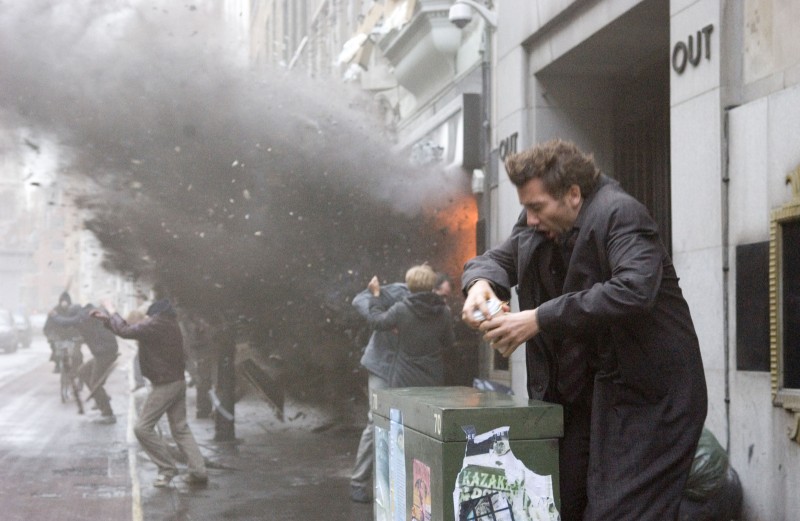 13. Children of Men (2006)
13. Children of Men (2006)
| From the original review: “Boasting a standout performance by Clive Owen…, great character work by Michael Caine, Chiwetel Ejiofor, and others; timely ruminations on issues ranging from the War on Terror to immigration reform; a wicked streak of black humor…; cinematography by Emmanuel Lubezki…that’s both striking and muted; and some of the most visceral urban-warfare scenes this side of Saving Private Ryan, the film has a lot in its corner, and is definitely worth checking out this holiday season.”
From the year-end list: “[O]ne of the most resonant ‘near-future’ dystopias to come down the pike in a very long while, perhaps since…Brazil. Crammed with excellent performances by Clive Owen, Michael Caine, Chiwetel Ejiofor and others, Children is perhaps a loosely-connected grab bag of contemporary anxieties and afflictions (terrorism, detainment camps, pharmaceutical ads, celebrity culture). But it’s assuredly an effective one, with some of the most memorable and naturalistic combat footage seen in several years to boot.“ |
From Brazil to Blade Runner, I’m always a sucker for a good, well-thought-out science fiction dystopia. And that’s what we got here with Alfonso Cuaron’s Children of Men, a smart and viscerally engaging sci-fi flick that riffed on everything from TMZ-style voyeurism (re: Baby Diego) to Big Pharma to anti-immigrant hysteria to, of course, the War on Terror. I still find the ending of the film a bit goofy, what with the highly-symbolic boat named Tomorrow and all that. But those long, drawn-out action takes more than make up for some occasional ham-handedness. And Clive Owen, Michael Caine, Chiwetel Ejiofor, and Julianne Moore, among others? That’s a Murderers’ Row.
 12. Letters from Iwo Jima (2006)
12. Letters from Iwo Jima (2006)
| From the original review: “Eastwood’s first crack at Iwo Jima in 2006, Flags of our Fathers, was to my mind a well-meaning dog…[But] Letters is really something quite remarkable. A mournful, occasionally shocking testament to the inhumanity and absurdities attending war, and a elegiac dirge for those caught in its grip, even on the other side of the conflict, Letters from Iwo Jima is an impressive — even at times breathtaking — siege movie. And strangely enough, elements that seemed trite or intrusive in Flags — the desaturated landscape, the minimalist piano score — are truly haunting and evocative here.”
From the year-end list: “To some extent the Unforgiven of war movies, Iwo Jima is a bleakly rendered siege film that trafficks in few of the usual tropes of the genre…Instead of glorious Alamo-style platitudes, we’re left only with the sight of young men — all avowed enemies of America, no less — swallowed up and crushed in the maelstrom of modern combat. From Ken Watanabe’s commanding performance as a captain going down with the ship to Eastwood’s melancholy score, Letters works to reveal one fundamental, haunting truth: Tyrants may be toppled, nations may be liberated, and Pvt. Ryans may be saved, but even ‘good wars’ are ultimately Hell on earth for those expected to do the fighting.“ |
What with Space Cowboys, Blood Work, Mystic River, Flags of our Fathers, Changeling, Gran Torino, and Invictus (which I caught the other day — review to follow in 2010), Clint Eastwood had a very prolific Oughts, and no mistake. And yet, while his worst movie of this bunch, 2004’s Million Dollar Baby, turned out to be considerably overpraised (even inexplicably winning Best Picture that year), his best outing of the decade — Letters from Iwo Jima — got mostly overlooked.
If Unforgiven was the deconstruction of Clint’s earlier, vengeance-driven westerns, and Gran Torino the disassembling of his vigilante, Dirty Harry ethos, this film was his pointed riposte to the war movies of his past. By flipping the script and putting us all in the other guy’s shoes for once — in this case, with the doomed Japanese defenders in the caves of Iwo Jima — Eastwood made it clear that war is ultimately youths killing youths, whatever the principles at stake, and there is no glory in it. In fact, it is a callous, bloody, unforgiving, and loathsome business, and don’t let any movie tell you different.
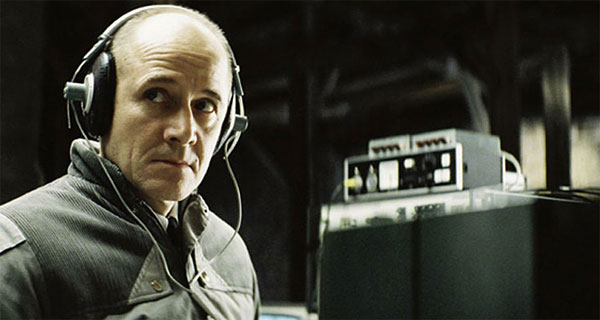 11. The Lives of Others (2006)
11. The Lives of Others (2006)
| From the original review: “I know very little about this subject, so I can’t vouch for how well van Donnersmarck recreates the rigors of East German life in the 1980s. Still, as an Orwellian parable of secrets and surveillance, The Lives of Others is a very worthwhile film, one strong enough to overcome some perhaps overly cliched moments of awakening by various characters along the way.”
From the year-end list: “[A] timely and compelling parable of art, politics, surveillance, and moral awakening in the final days of the Stasi. In a way, Lives is an East German counterpart to Charlie Wilson’s War, a story about how even small political acts of individual conscience can change the world, even (or perhaps especially) in a decaying Orwellian state. With a memorable central performance by Ulrich Muhe and a languid conclusion that ends on exactly the right note, the resoundingly humanist Lives of Others is a Sonata for a Good Man in Bad Times. We could use more of its ilk.“ |
One could argue, I suppose, that The Lives of Others is really just 1984 with a happy ending, as if O’Brien just had an epiphany over Beethoven one day and decided to go out of his way to save Winston and Julia (or Winston, at least) from the Ministry. And that would be a fair criticism — the motivations of Ulrich Muhe’s chief inspector do seem a bit underwritten as presented here. He listens to some good music, reads a play, sees a kid, and Blammo! We got ourselves a man on the inside!
Still, The Lives of Others worked for me, particularly if you consider that it takes place near the fall of the East German regime. With its long, Return of the King-like conclusion, this is arguably the story of not only life under the Stasi, but how Germany ultimately moved past it to reunification. And, all that aside, I thought Lives was a stirring example — or fable, perhaps — of how art, humanity, and conscience can successfully conspire against power, surveillance, and corruption. After all, bureaucracies are only as all-powerful and hegemonic as the humans that staff them, and, to paraphrase Leonard Cohen, those cracks are where the light gets in.
And now, the best ten films of the Oughts.

